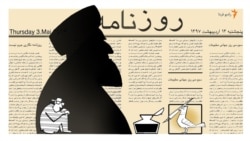Before his election as Iran’s new president, Ebrahim Raisi was head of the country’s judiciary. And earlier, during 1980s and 1990s, he was a deputy prosecutor in Tehran.
In 1988, according to Human Rights Watch, Raisi played a role in the extrajudicial killings of thousands of political prisoners in Iran.
Given his new, higher-profile position – along with recent moves in Iran to further restrict speech and media freedom – a statement Raisi made while head of the judiciary is worthy of review.
In May of 2019, Raisi had just been appointed to the top judicial post by Iran’s Supreme Leader, Ayatollah Seyyed Ali Khamenei.
“This branch (the judiciary) supports the freedom of the press,” Iran International quoted Raisi as saying. “The judiciary sees the media as its colleagues and does not oppose fair criticism.”
But the claim is false.
Raisi’s court system is the entity responsible for prosecuting journalists and human rights defenders in Iran. And it’s one of the most barbaric judicial systems on the planet.
Like most everything in Iran, the judiciary is ultimately controlled by Supreme Leader Khamenei. He appoints not only the head of the judiciary but its members and the general prosecutor.
Iran’s judiciary includes courts that deal with civil and criminal cases, clerical courts that deal with crimes committed by Islamic clerics, and revolutionary courts that prosecute political cases, including those targeting protesters, journalists, human rights defenders and reformist politicians.
In his 2019 remarks, Raisi emphasized that the press must respect the “regime’s rights.” He also encouraged news media to incite public hatred toward enemies rather than report on corruption, and he warned journalists they would end up in jail if they failed to respect “red lines.”
The United States has sanctioned Raisi for crimes against humanity. With close ties to Iran’s clerical hierarchy, some experts see him as Khamenei’s likely successor. Raisi’s election has raised fears that suppression of the media in Iran will intensify.
This week, Reuters reported that the United Nations investigator for human rights in Iran called for an investigation into the state-ordered executions while Raisi was deputy prosecutor in Tehran.
Iran’s judiciary is known for issuing brutal sentences. The United States Institute of Peace (USIP), a U.S. government-funded research institution, described the judiciary this way in 2015: “The judiciary implements the Islamic penal code, including stoning, amputations and flogging, all considered torture under international law. Iran also has the largest number of executions of any country proportional to its population.”
According to Freedom House, a Washington, D.C., global human rights monitor, Iran’s judicial system is a tool for silencing regime critics.
“Political dissidents and advocates of human and labor rights have continued to face arbitrary judgments, and the security apparatus’s influence over the courts has reportedly grown in recent years,” Freedom House said in its most recent annual report. “Executions of high-profile dissidents and anti-government protesters also continued during the year.”
According to the press freedom watchdog group Reporters Without Borders (RSF), Iran executed more journalists in the past 50 years than any other country. Last year, Iran ranked 173rd out of 180 in RSF’s World Press Freedom Index.
Rouhollah Zam, an Iranian journalist and activist, was abducted in Iraq in 2019, taken to Iran and sentenced to death by an Iranian revolutionary court in June 2020.
Zam was accused of “spreading corruption on earth” because of his Telegram channel, AmadNews, which had helped spark economic protests across Iran in 2017. Iran’s Supreme Court later claimed it had suspended Zam’s death sentence, but Amnesty International reported that he was hanged in December 2020.
The Committee to Protect Journalists, in New York City, reported that as of December 2020 at least 15 journalists were imprisoned in Iran.
They included award-winning journalist Mohammad Mosaed, arrested for covering a November 2019 crackdown on protests and the government’s lack of preparedness in responding to the COVID-19 pandemic. He was sentenced to four years and nine months in prison, followed by a two-year ban from journalism.
Mosaed was able to flee Iran to Turkey in early 2021.
Environmental journalist Elaheh Mousavi was summoned by authorities several times for exposing illegal logging and deforestation by the military and other governmental entities in northern Iran. In May, prosecutors summoned her again for her environmental activism.
In May, Mousavi sent a message to Raisi via Twitter saying that those who reveal corruption must be honored not punished.
Fighting corruption was one of the promises Raisi made during his campaign for the presidency.
Al Jazeera reported on June 25 that while conservative factions in Iran control most influential media outlets, some space is given to moderate newspapers. But they can’t stray too far.
Iran International, an independent U.K.-based news agency focusing on Iran, reported that in the wake of Raisi’s election allies in Iran’s parliament plan to regulate social media messengers.
A new bill requires the ministry of communications to reveal all user names and ban virtual private networks, or VPNs, which Iranians use to get around digital censorship.
In January, Iran’s prosecutor general, who operates under the judiciary and heads a committee tasked to identify and censor online “criminal content,” blocked the Signal phone messaging app, which allows for encrypted communications on smart phones and computers.
As Al Jazeera reported, the Iranian authorities have already blocked other top social media applications, including Telegram, Twitter, Facebook and YouTube.
The nonprofit Iran Human Rights reported on June 10 that Iran’s parliament is also considering a bill that could institute harsh penalties against citizen journalists who run afoul of authorities.
The proposed law, called “Intensifying Punishments for Collaborators with Actions of Hostile States Against National Security and Interests Bill,” provides for prison terms of two to five years and even a death sentence.









